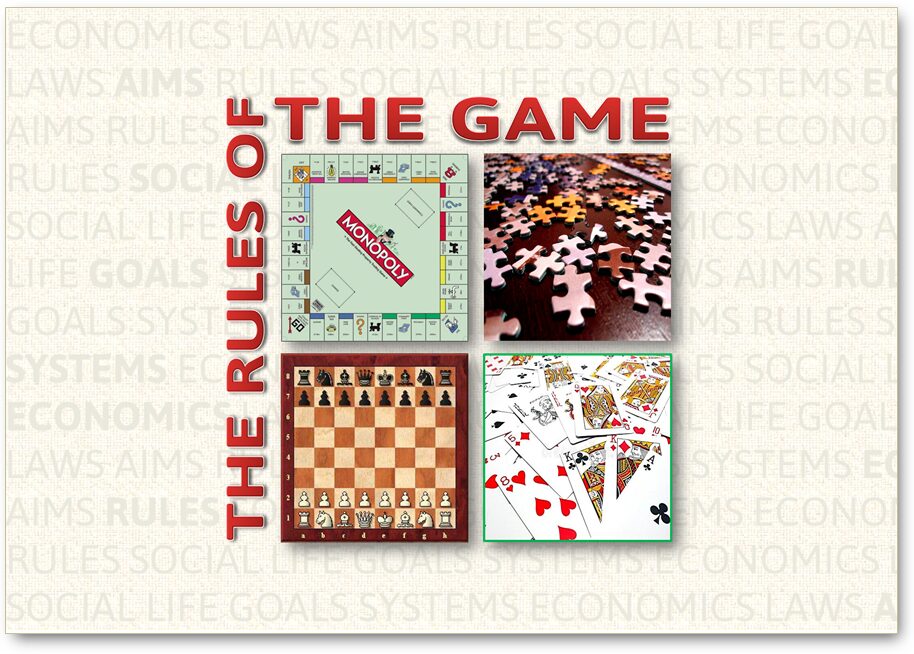
Let’s take a look at one of the most widely known board games: Monopoly.
It has been around for about 120 years since its invention back in 1903; hence we decided to use this game as a referral because many already know the rules and will understand the deeper reflections.
Let’s start by saying that, if you have never played Monopoly or if you are a novice player, the first thing you should do is to understand THE RULES. From there, you will learn how to start the game, use the money bills, buy houses, buy hotels, and understand the conditions to become a winner, i.e. the ULTIMATE GOAL.
The game, when played by different people, can take completely different paths: there are those who are more cautious, those who are more unscrupulous, etc.; everyone has his or her own values and attitudes. Obviously, the rules of the game could favor, or not, certain morals. According to the mix of the players and their values, the evolution of each single match could be very different. The game played by the same players will also take a different course each time, depending on their past experiences and maybe different strategies on how to reach their goals. Moreover, a big role is covered by the luck of the players in rolling the dice, as well as the function of the Community Chest and Chance cards.
The combination of rules, values, people and chance make each match unique. However, apart from the duration and the dynamic aspects of each single contest, the final result won’t change! The player who will become the wealthiest will be the winner, all the others will be losers. That’s basically it!
Until here, there is nothing extraordinary said.
So, let’s take one step forward. Let’s suppose that at a certain point someone proposes to change something to achieve a certain purpose. A slight change could be: doubling the nominal value of the buildings to finish the money on hand faster and potentially reduce the time spent on a single competition. Even if there is no change to the substance of the game and the final goal remains the same, this variation would undoubtedly generate some debates among players. Are all of them in agreement? Why not even triple the value, instead? And so on…
Sometimes you can make various small retouches to the majority of the rules without modifying the overall substance. At other times, all it takes is just one single change to a fundamental and significant rule, and the game could transform quite intensely. The greater the change in the rules, the greater the resistance you will encounter among players on its implementation, despite the fact that everything physical remains the same (money bills, buildings, dices, game board, etc.).
Let’s move on and take the final step forward. Imagine if one day, within a group of people who regularly gathers up to plays Monopoly on a weekly basis, someone proposes to change the pastime completely, for example assembling puzzles. What will happen? The debate may become even more intense in this case.
Regardless of the good intentions of the proposers, change will always generate debates. Conservatives (lovers of the status quo) will confront with innovators (lovers for advancement).
Economics, and social life based on its rules, is just like a board game. It’s NOT science. It’s NOT about physical laws, which by nature are given and immutable. Economics is simply a choice made by human beings, on the rules to follow in order to regulate and govern social life. If you like it, go for it and maybe make little tweaks here and there to adapt it to social trends, etc. But if you don’t like it, make concrete proposals that can eventually become a reality. Different models could also co-exist, they don’t necessarily exclude one another. It’s not like gravity or the movements of planets and stars across the universe, it’s something that we humans could modify overnight. Ok, alright… we don’t want to make excessive statements, we know that it’s not that easy. However, what we want to stress though, is that … IT’S NOT THAT DIFFICULT and IT IS NOT IMPOSSIBLE at all!
How can life that enwraps us every day change, if we don’t make modifications? If you are not interested in transformation or you are but you are not yet conscious of this hidden need of yours, this question could sound trivial. Nevertheless, if you don’t like what surrounds you, this is THE QUESTION.
People tend to view the world and its social dysfunctions as we view hurricanes or earthquakes, but these are completely different phenomena. Believe it or not… economics, social life and its dysfunctions can be changed relatively easily!
The Metaphor, one of the central chapters of the book Project Humanity 7.0, makes a parallel between board games and social dynamics. You could be surprised by the amount we can learn from a very simple similarity like this. In this article, we just gave you small taste of it; we will cover more aspects in future posts.
Project Humanity 7.0 proposes concrete solutions that start with the world we presently know, and brings it towards an evolution for our society, without sacrificing the main benefits. With just some modifications on the rules of the game, we can bring it up a few notches to make it even more worthy! If we can have more, why should we be happy with less?